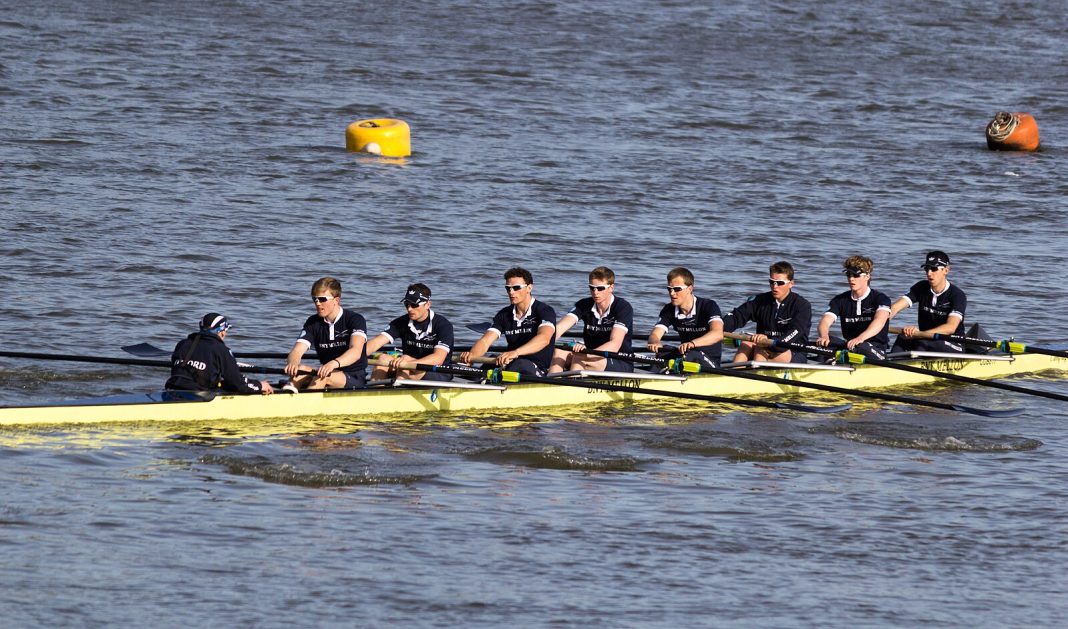The President’s Challenge – the annual tradition that marks the official launch of the Boat Race – was this year accompanied by another, rather curious, announcement. The race, first broadcast on BBC Television in 1938, will now instead be broadcast exclusively on Channel 4 in the UK from 2026.
There is no way to construe this as anything other than a big loss for the BBC: last year’s race coverage drew 2.8 million viewers, and the women’s race remains the second most watched women’s sporting event of the year in the UK, behind only the summer’s Euros.
The loss of the broadcasting rights to the Boat Race does not come as too much of a surprise, however, as it is merely the latest in a long-running trend of major sporting events moving off the BBC. Since 2012, the BBC has lost all live TV broadcasting rights to The Open, The Grand National, and Royal Ascot, each of which a key fixture in the British sporting calendar. The BBC also gave up its rights to broadcast Formula 1 races in 2015 and hasn’t shown a live English cricket test match since 2005.
This leaves us with the question of why: what has led what was once the home of British sports broadcasting to discontinue its live coverage of so many different events? It is not “wokery in action” coming from a Director of Sport with a dislike of Oxbridge as some have claimed. The answer appears to be far simpler than that: money.
The cost of TV broadcasting rights has risen dramatically in recent decades. It will come as no shock that football leads the way: the last package of domestic rights alone cost a total of £6.7 billion. Other sports too have seen costs increase significantly. The most recent Six Nations Rugby Union rights package was reportedly worth an estimated £90 million per year, and the ECB’s cricket rights deal with Sky that expired last year totalled £220 million across its duration.
The astronomical cost of broadcasting sport seems to have priced out the BBC. This has been compounded by a period of uncertainty and declining income for the organisation. Record numbers of households have been cancelling their licence fee in recent years, leading to calls to completely reform the funding model. This has increased pressure on leaders to keep budgets tight and avoid what might be deemed unnecessary expenditure.
Sport appears to have fallen victim to these cost-cutting measures. While the Boat Race will be staying on free-to-air television with Channel 4, many of the live sports whose rights the BBC has surrendered now exist entirely behind a paywall. The full Sky Sports package starts at £22 a month, an additional cost of over £240 a year. The British public is suffering as a consequence.
Primarily, this trend is depriving much of the nation of the opportunity to watch live sport. The BBC exists as a public service, and the provision of live sport has long been a part of this. It provides entertainment, drama, and attachment to a social identity. There are even studies linking watching live sport to improved mental wellbeing. By putting sport behind a paywall, only those who can afford to pay are able to access these benefits.
Only those who have significant disposable income are now able to enjoy lots of the country’s live sport, This is only acting to deepen the class divides that are so entrenched in British society. While football may be so important to so many that it does not face this issue, the same cannot be said for other sports. Sports like rugby and cricket are having their reputations as the preserve of Britain’s middle and upper-classes reinforced, and risk disappearing from the working-class consciousness altogether.
There are also worrying implications for racial integration. Sport has historically been a critical avenue for people arriving from abroad to socialise and settle into local communities: cricket has been identified as hugely important in the experience of Caribbean communities settling in England throughout the 20th century. It is clear that, as much as ever, Britain is in need of shared cultural pursuits that cut across the dividing lines of race and immigration status. The decline of many sports amongst the general public, in no small part due to their lack of visibility on national TV, is depriving the country of key tools to foster integration and unity. The BBC is failing us in this aspect of its public service.
It is also difficult to avoid the sense that we are being robbed of the opportunity for more truly ubiquitous national sporting moments. Events like the World Cup and Euros are elevated into the national conversation by the fact that anyone can watch them. Other sports outside of football are capable of bringing together the nation in a similar manner. The 2005 Ashes series captured the nation’s attention as England triumphed over Australia for the first time in over 18 years. But the disappearance of international cricket from free-to-air TV means we are unlikely to see a repeat.
In a political environment that feels increasingly polarised, and a country that often seems as disunited as it has ever been, the loss of more opportunities for moments of sporting captivation on national TV is to be lamented. The Boat Race moving off of the BBC is another small sign of the decline of the BBC’s role in providing Britain with live sports coverage. We can only hope that action is taken to prevent further damage to the BBC’s sports slate and its contribution towards national cohesion.


